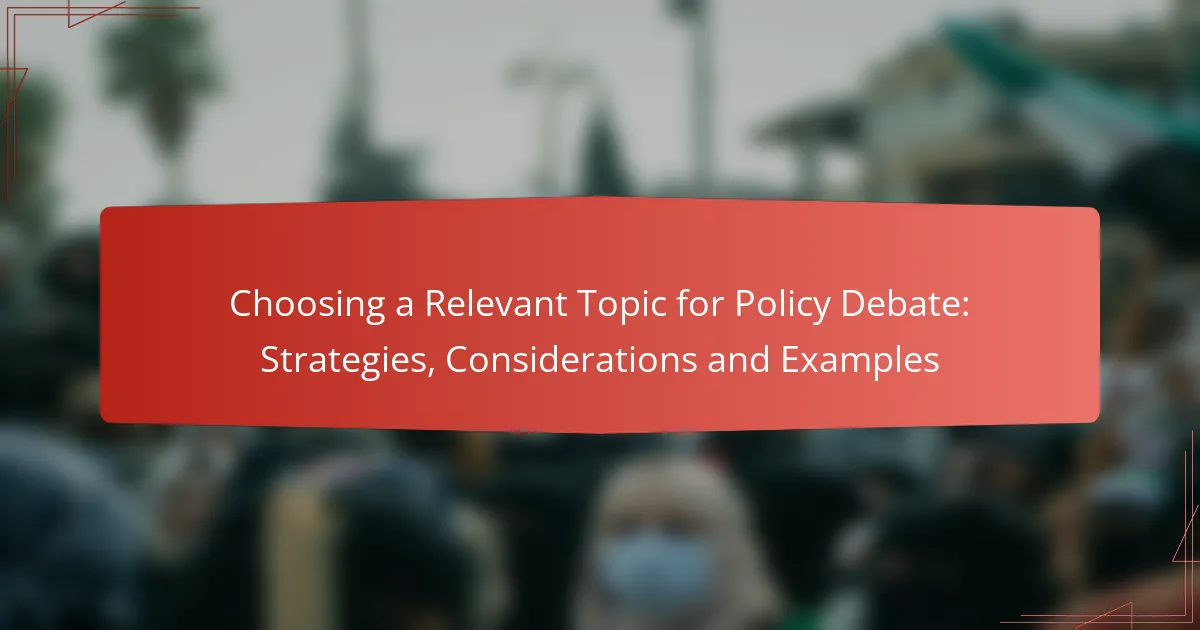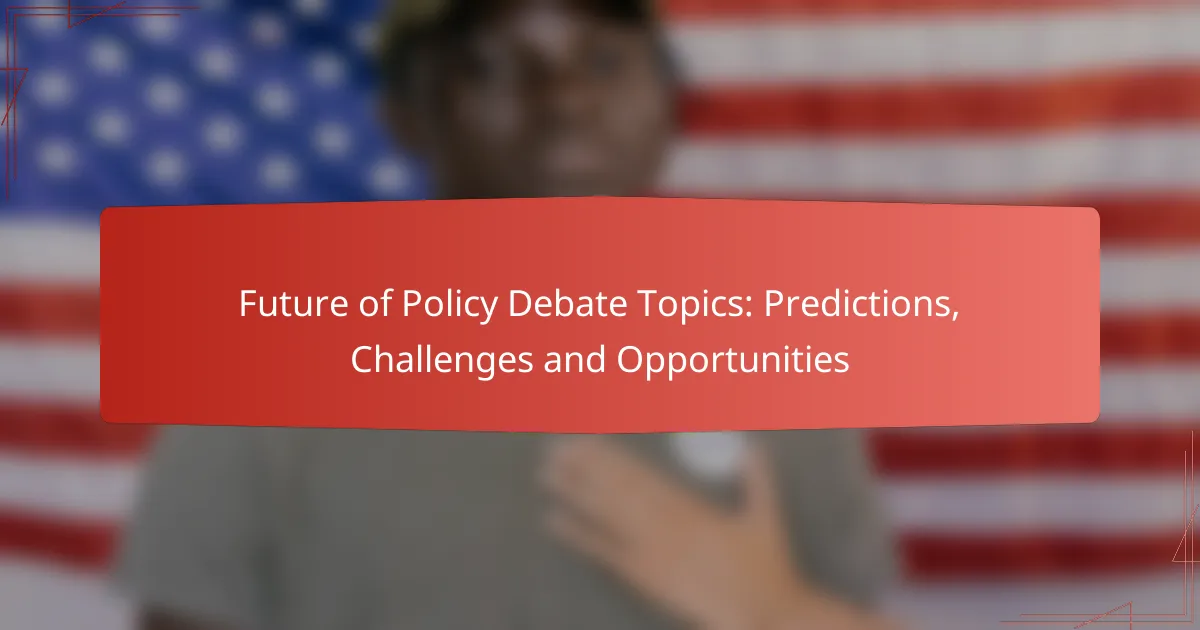Choosing a relevant topic for policy debate is crucial for fostering engaging and meaningful discussions. It involves identifying pressing societal issues, assessing public interest, and ensuring that there is sufficient research available to support the debate. By considering factors such as relevance and impact, debaters can select topics that not only stimulate conversation but also contribute to potential solutions for real-world challenges.
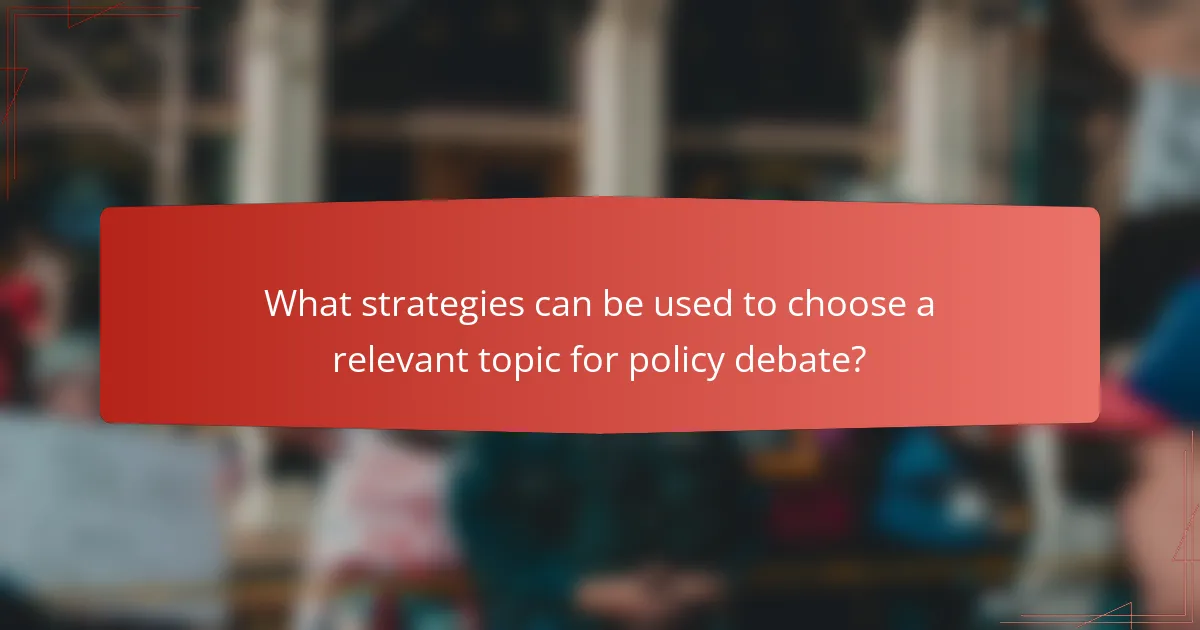
What strategies can be used to choose a relevant topic for policy debate?
Choosing a relevant topic for policy debate involves identifying pressing issues, gauging public interest, and ensuring the feasibility of discussion. Effective strategies include engaging with stakeholders and reviewing historical debates to inform your choices.
Identifying current issues
Start by monitoring news outlets, social media, and academic journals to pinpoint current issues that resonate with society. Topics such as climate change, healthcare reform, and economic inequality often generate significant discourse and can serve as strong candidates for debate.
Consider local and global contexts, as some issues may have more relevance depending on your audience’s location. For instance, urban housing policies might be more pertinent in metropolitan areas compared to rural settings.
Analyzing public interest
Assess public interest through surveys, polls, and social media engagement to gauge which topics resonate most with your audience. High engagement levels often indicate a topic’s relevance and potential for spirited debate.
Utilize tools like Google Trends to analyze search interest over time, helping you identify emerging topics that may not yet be widely discussed but are gaining traction.
Assessing feasibility of discussion
Evaluate whether the chosen topic can be adequately discussed within the constraints of time and resources. Consider the availability of research materials, expert opinions, and data to support arguments.
Ensure that the topic is not overly broad or too niche, as this can hinder meaningful debate. Aim for a balance that allows for diverse viewpoints while remaining focused enough to facilitate in-depth discussion.
Engaging with stakeholders
Involve stakeholders such as community leaders, policymakers, and subject matter experts to gain insights into the relevance and implications of potential topics. Their perspectives can help refine your focus and highlight critical aspects that may not be immediately apparent.
Organizing forums or discussions with these stakeholders can also foster collaboration and generate additional ideas for topics that matter to the community.
Reviewing historical debates
Examine past policy debates to identify successful topics and strategies. Historical context can reveal how certain issues have evolved and the effectiveness of various arguments used in previous discussions.
Look for patterns in what has engaged audiences in the past, as well as any shifts in public opinion that may influence current debates. This analysis can guide you in selecting topics that are both relevant and timely.
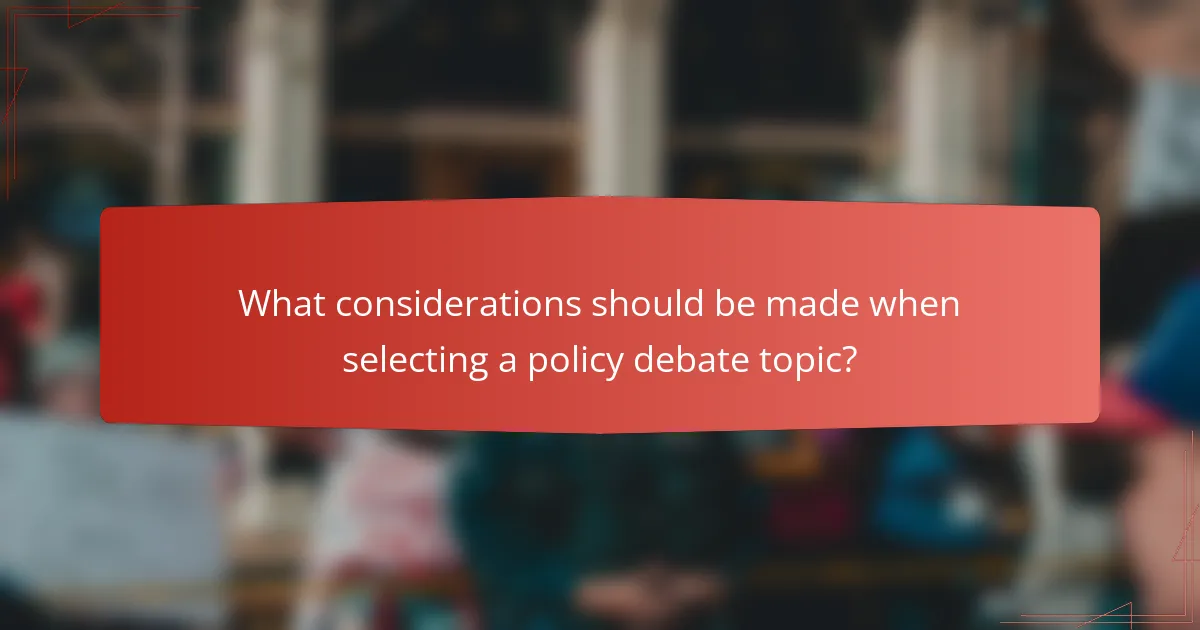
What considerations should be made when selecting a policy debate topic?
When selecting a policy debate topic, it is essential to consider its relevance, impact, and the availability of supporting research. A well-chosen topic not only engages participants but also fosters informed discussions that can lead to meaningful conclusions.
Relevance to local communities
The topic should resonate with the specific issues faced by local communities. This ensures that the debate is not only theoretical but also practical, addressing real-world challenges. For instance, a topic like affordable housing may be more pertinent in urban areas experiencing rapid population growth.
Engaging with community members can provide insights into pressing concerns, helping to refine the topic selection. Consider conducting surveys or attending local meetings to gauge what issues are most significant to residents.
Impact on various demographics
Assessing how a policy debate topic affects different demographic groups is crucial. Topics should be chosen based on their potential impact on various segments, such as age, income, and ethnicity. For example, a debate on healthcare reform may have differing implications for young families versus senior citizens.
Understanding these impacts can help frame arguments and counterarguments effectively. It’s beneficial to research demographic data to identify which groups are most affected and how they might respond to proposed policies.
Availability of research and data
A strong policy debate topic should be supported by ample research and data. This availability allows participants to construct well-informed arguments and counterarguments. Look for topics that have been extensively studied or have accessible statistics, such as climate change policies or education reform.
Utilizing reputable sources, such as government reports, academic journals, and think tank publications, can enhance the quality of the debate. Ensure that the data is current and relevant to maintain the integrity of the discussion.
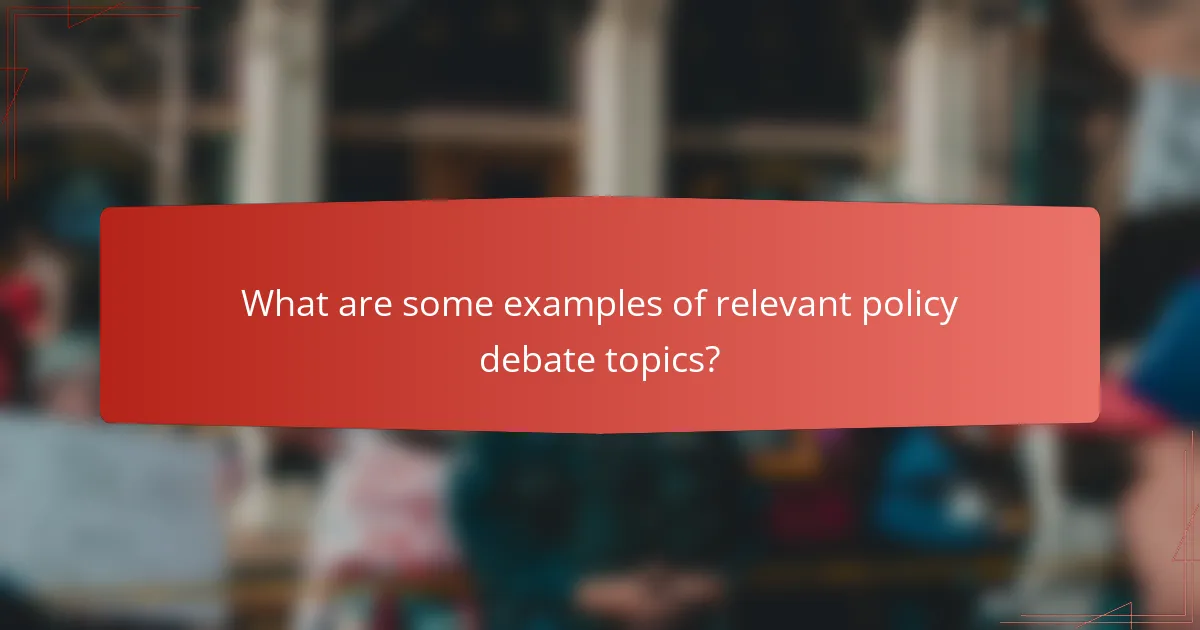
What are some examples of relevant policy debate topics?
Relevant policy debate topics often focus on pressing societal issues that require thoughtful discussion and potential solutions. Examples include climate change policies, healthcare reform initiatives, and education funding debates, each presenting unique challenges and opportunities for debate.
Climate change policies
Climate change policies address the urgent need to mitigate environmental impacts and promote sustainability. Key considerations include carbon emissions regulations, renewable energy incentives, and international agreements like the Paris Accord. Debaters should explore the trade-offs between economic growth and environmental protection.
For instance, policies promoting solar and wind energy can reduce reliance on fossil fuels but may require significant upfront investment. Engaging with local regulations and incentives can provide practical examples for debate, such as tax credits for renewable energy installations in the EU or the U.S.
Healthcare reform initiatives
Healthcare reform initiatives focus on improving access, affordability, and quality of care. Important aspects include universal healthcare proposals, insurance market regulations, and prescription drug pricing reforms. Debaters should weigh the benefits of universal coverage against potential tax implications and service availability.
Examples of healthcare reform include the Affordable Care Act in the U.S., which aimed to expand coverage and reduce costs, and various single-payer systems in countries like Canada. Understanding the local healthcare landscape is crucial for effective debate.
Education funding debates
Education funding debates revolve around how to allocate resources effectively to improve educational outcomes. Key issues include public versus private funding, equitable distribution of resources, and the impact of standardized testing. Debaters should consider the implications of funding models on student performance and equity.
For example, discussions may focus on the benefits of increased funding for under-resourced schools versus the potential drawbacks of diverting funds from established institutions. Local contexts, such as state-level funding formulas in the U.S. or national education budgets in the UK, can provide relevant case studies for debate.
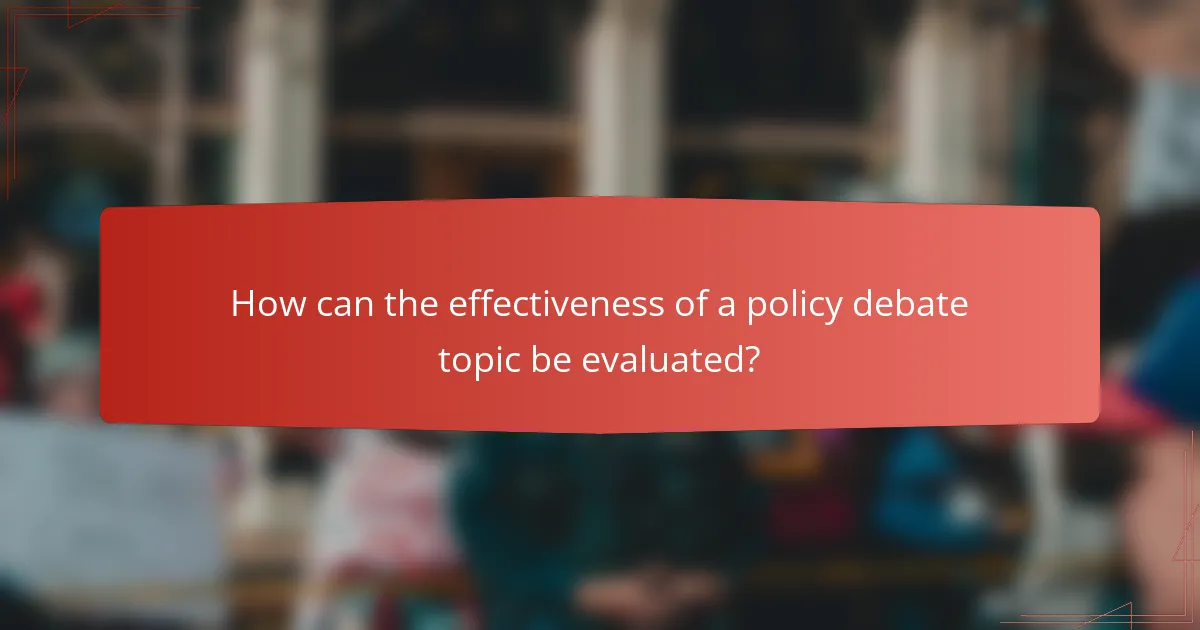
How can the effectiveness of a policy debate topic be evaluated?
The effectiveness of a policy debate topic can be evaluated by examining its relevance, engagement potential, and the quality of discourse it generates. Key factors include public interest, expert feedback, and the topic’s ability to provoke thoughtful discussion and analysis.
Public engagement metrics
Public engagement metrics are essential for assessing how well a policy debate topic resonates with the audience. These metrics can include social media interactions, attendance at debate events, and survey responses regarding interest levels. For instance, a topic that generates high social media shares and comments is likely to be more engaging.
To evaluate these metrics effectively, consider tracking engagement over time and comparing it to previous topics. A consistent increase in engagement can indicate a growing interest in the subject matter, while a decline may suggest the opposite.
Expert opinions and feedback
Gathering expert opinions and feedback is crucial for understanding the depth and relevance of a policy debate topic. Experts can provide insights into the topic’s implications, potential challenges, and areas for further exploration. Engaging with academics, practitioners, and industry leaders can yield valuable perspectives.
To obtain expert feedback, consider hosting roundtable discussions or conducting interviews. Additionally, reviewing published articles or white papers on the topic can help gauge its significance within the field. Aim for a diverse range of expert opinions to ensure a well-rounded evaluation.
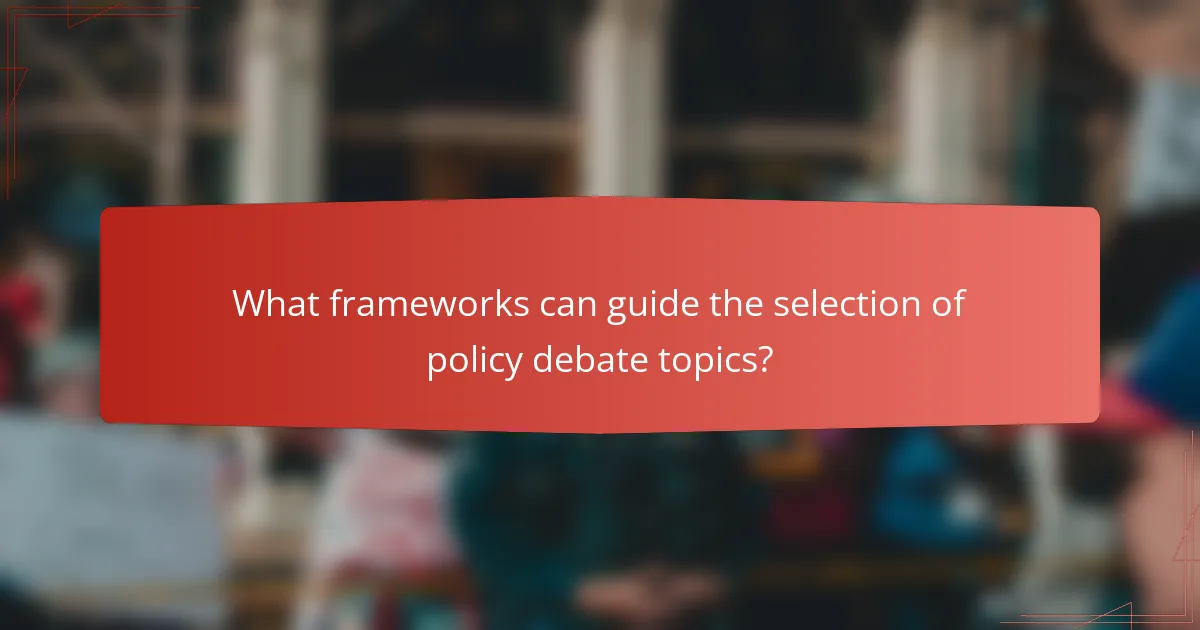
What frameworks can guide the selection of policy debate topics?
Frameworks such as SWOT analysis and stakeholder mapping provide structured approaches to selecting relevant policy debate topics. These methods help identify strengths, weaknesses, opportunities, and threats, as well as the interests and influence of various stakeholders involved in the debate.
SWOT analysis
SWOT analysis involves evaluating the strengths, weaknesses, opportunities, and threats related to a potential debate topic. Start by identifying the strengths of the topic, such as its relevance to current events or its potential to engage audiences. Next, consider weaknesses, including any lack of available data or public interest.
Opportunities may include emerging trends or gaps in policy that the debate could address, while threats could involve opposing viewpoints or potential backlash. By systematically assessing these factors, debaters can choose topics that are not only timely but also strategically advantageous.
Stakeholder mapping
Stakeholder mapping helps identify and analyze the various parties affected by or interested in a policy debate topic. Begin by listing key stakeholders, such as government agencies, non-profit organizations, and community groups. Assess their interests, influence, and potential impact on the debate.
Understanding stakeholders’ positions can guide the selection of topics that resonate with their concerns and priorities. This approach ensures that the debate is relevant and can foster constructive dialogue among diverse groups, ultimately enhancing the quality and depth of the discussion.

What emerging trends are influencing policy debate topics?
Emerging trends significantly shape policy debate topics by reflecting current societal challenges and technological advancements. Understanding these trends helps debaters select relevant and impactful issues to discuss.
Digital transformation in governance
Digital transformation in governance refers to the integration of digital technology into all aspects of public administration. This shift enhances transparency, efficiency, and citizen engagement but also raises concerns about data privacy and cybersecurity.
Debaters should consider how digital tools can improve policy-making processes, such as using data analytics for informed decisions or implementing e-governance platforms. However, they must also address the digital divide, ensuring equitable access to technology across different demographics.
Increased focus on social justice
The increased focus on social justice highlights the need for equitable policies that address systemic inequalities. Topics such as racial equity, gender rights, and economic disparity are gaining traction in policy debates.
When selecting topics, consider the implications of social justice on various sectors, including education, healthcare, and employment. Debaters should be prepared to discuss both the benefits of inclusive policies and the challenges of implementing them effectively.
Global health challenges
Global health challenges encompass issues like pandemics, access to healthcare, and environmental health risks. These topics are increasingly relevant as nations grapple with the impacts of COVID-19 and other health crises.
Debaters can explore various angles, such as the effectiveness of international cooperation in health responses or the role of technology in improving healthcare access. It’s crucial to consider how different countries prioritize health policies based on their unique circumstances and resources.
